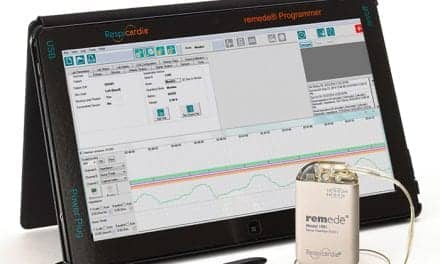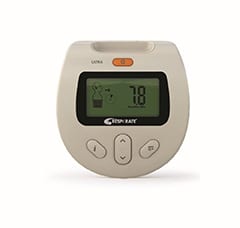The peer-reviewed journal Nature and Science of Sleep has published five-year results from the remedē System Post Approval Study. The data show sustained safety and efficacy of transvenous phrenic nerve stimulation for the treatment of moderate to severe central sleep apnea (CSA). The remedē System, the only implantable device approved by the US Food and Drug Administration (FDA) to treat moderate to severe CSA in adult patients with reduced cardiac function, was developed by Respicardia Inc, which was acquired by ZOLL in April 2021.
The Post Approval Study was led by Maria Rosa Costanzo, MD, principal investigator for the pivotal trial of the remedē System and medical director at Edward Hospital Center for Advanced Heart Failure and Heart Failure Research at Advocate Heart Institute, with contributions from Drs Shahrokh Javaheri, Piotr Ponikowski, Olaf Oldenburg, Ralph Augostini, Lee Goldberg, Christoph Stellbrink, Henrik Fox, Alan Schwartz, Sanjaya Gupta, William Abraham, as well as Scott McKane and Timothy Meyer.
The five-year data show sustained improvements from baseline that were highly consistent with the previously published six-, 12-, 24-, and 36-month results. The five-year results include:
- 96% reduction in central apneas
- Overall apnea hypopnea index (AHI) reduced by 22 events/hour of sleep
- Arousals reduced by 14 events/hour of sleep
- 14 percentage point (absolute) increase in deep sleep (N2–REM) and a 19 percentage point decrease in light stage sleep (N1)
- Sustained improvement in daytime sleepiness
- Consistent safety, in line with previously published data
[RELATED: Why I Choose Neurostimulators for Some of My Sleep Apnea Patients]
“It is an important milestone for a therapy to demonstrate sustained patient safety and benefit over five years,” says Robin Germany, MD, chief medical officer of ZOLL Respicardia, in a release. “Phrenic nerve stimulation continues to show a significant and durable improvement in patient outcomes, including reduction in sleep apnea events, improvement in sleep architecture, and improvements in quality of life metrics. We congratulate all of the coauthors, study investigators, and patients who have contributed to the data collection and publication of this five-year study. We will continue to advance research on central sleep apnea and transvenous phrenic nerve stimulation as we increase access to the therapy for patients in need.”
“Patients with central sleep apnea have historically been underserved, both in terms of research into the disease and the development of effective therapies designed to treat it,” says Peter Sommerness, president of ZOLL Respicardia, in a release. “Transvenous phrenic nerve stimulation continues to deliver remarkable results, giving clinicians and patients confidence in the long-term safety and efficacy of the therapy.”
The remedē System was approved to treat moderate to severe CSA in adult patients by the FDA in 2017. The remedē System is an implantable device that activates automatically each night to stimulate a nerve in the chest (phrenic nerve) that sends signals to the breathing muscles (diaphragm) to help restore a normal breathing pattern. The Post Approval Study followed patients from the pivotal trial through five years post implant.




